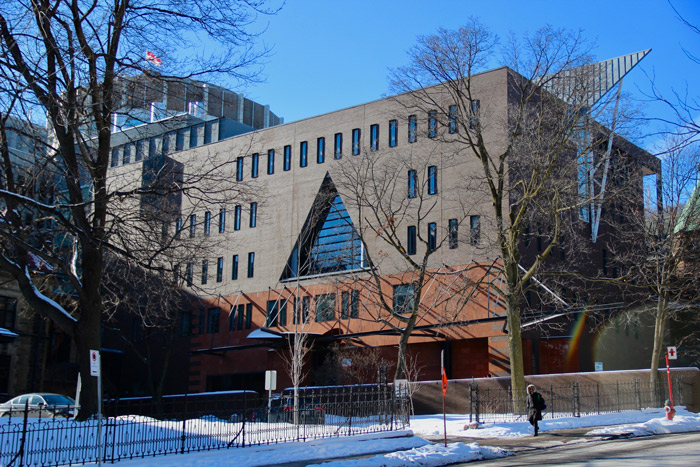On Nov. 8, the McGill Muslim Law Students’ Association (MLSA) hosted a panel discussion at which Law Professors Colleen Sheppard, Mark Walters, and Johanne Poirier weighed in on the constitutionality of Bill 62. Panelists offered different perspectives on the legislation—which the National Assembly of Quebec passed three weeks prior—to discuss its potential infringement upon religious freedom rights.
In a proclaimed effort to uphold state religious neutrality, section 10 of Bill 62 introduced a ban on wearing face coverings when giving or receiving public services, including public transit, healthcare, and education. MLSA hosted the panel following debates among students over the legality of this bill, particularly with respect to the seemingly disproportionate effect it has on Quebec’s Muslim community.
“We decided that instead of speculating as students, it would be beneficial to all to educate ourselves on [Bill 62’s] validity from experts in the field,” the MLSA wrote in a message to The McGill Tribune. “This is why we organized this event, to enlighten ourselves and help others understand whether this law is constitutional.”
The panel opened with Sheppard arguing that, although many of its provisions are sound—such as the call for equitable treatment of citizens regardless of religious affiliation—the problem with Bill 62 lies in its mandate that all persons have their face uncovered during public exchanges. For Sheppard, it is this addition that renders the legislation out of sync with its earlier notion of state neutrality.
“The fundamental flaw of this law is that it targets a particular religious group at a moment when it is endeavoring to advance religious accommodation and state neutrality,” Sheppard said. “[Bill 62] is internally contradictory and incoherent.”
Sheppard also discussed how the bill discriminates on the basis of both religion and gender because Muslim women wearing niqabs will be systematically excluded from accessing public services. In targeting an already marginalized group, the law undermines gender equality.
“[Bill 62] is perpetuating stereotypes about Muslim women’s helplessness, their oppression, their non-integration in society, and so perpetuates a kind of islamophobia,” Sheppard said. “[Bill 62] could be counterproductive and work against women’s emancipation, potentially increasing their isolation from society.”
In contrast, Walters explained why the court might uphold the statute, proposing a connection between the law and its purpose.
“Section 10 isn’t about religion, it’s about making sure that public officials can identify people when necessary, can communicate with them, and can ensure public security,” Walters said. “Its purpose is not about restricting rights to freedom of religion, and so its purpose is not discriminatory.”
Although Walters maintained that some situations do necessitate facial identification—for example, when assessing the credibility of a witness in court—he admits that such cases are rare. To Walters, the majority of public interactions do not justify the removal of face coverings for the sake of facilitating proper communication, such as when a Muslim woman in a public library would be required to remove her niqab while speaking to staff members.
Poirier concluded the panel by examining the rulings of the European Court of Human Rights (ECHR) on the cases of Belgium and France, both of which authorized a complete ban on public face-coverings in 2011. She considered the impact of such legislation on coexistence, a value she believes should be upheld in society, with the panelists agreeing that the extent to which Bill 62 can be applied to everyday life is currently ambiguous.









“[Bill 62] is perpetuating stereotypes about Muslim women’s helplessness, their oppression, their non-integration in society, and so perpetuates a kind of islamophobia,”
It perpetuates this about Muslim women who wear niqabs, not Muslim women in general. And those stereotypes aren’t unreasonable either.
Seeing each other face to face seems to me to be key to how we interact in our society, if someone who opts out of this can be considered fully integrated, I don’t know what “integration” even means.
In terms of helplessness and oppression, do we really think that every Muslim woman who wears a niqab could decide to not wear it anymore without social consequences? That this is just a free choice made in a vaccuum in all cases? It’s fascinating how any Western double standards left about male and female nudity can be considered sexist and oppressive, but a culture that tells women to cover up entirely is a-OK.
I think Bill 62 is probably a bad idea, but not for the reasons stated here.